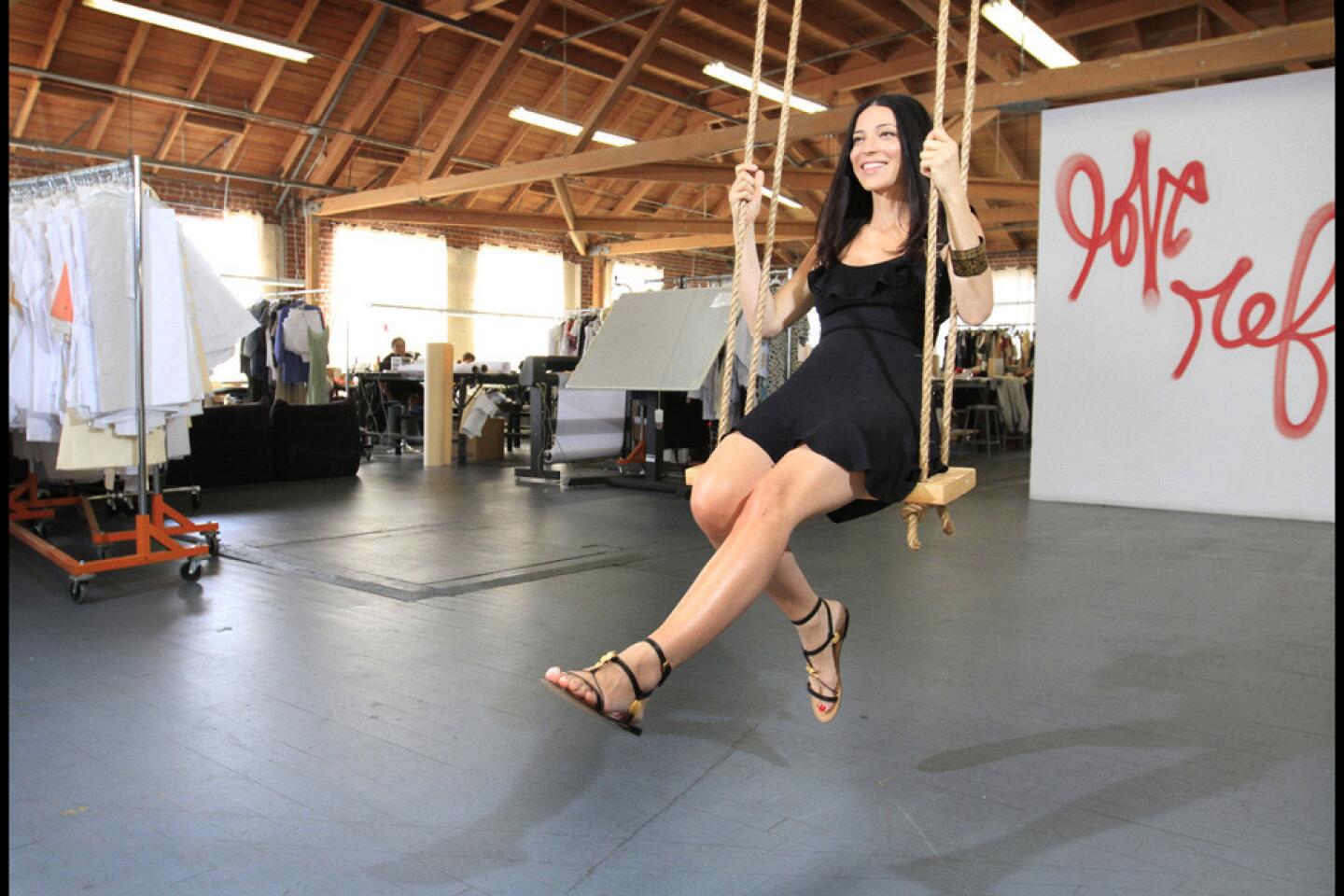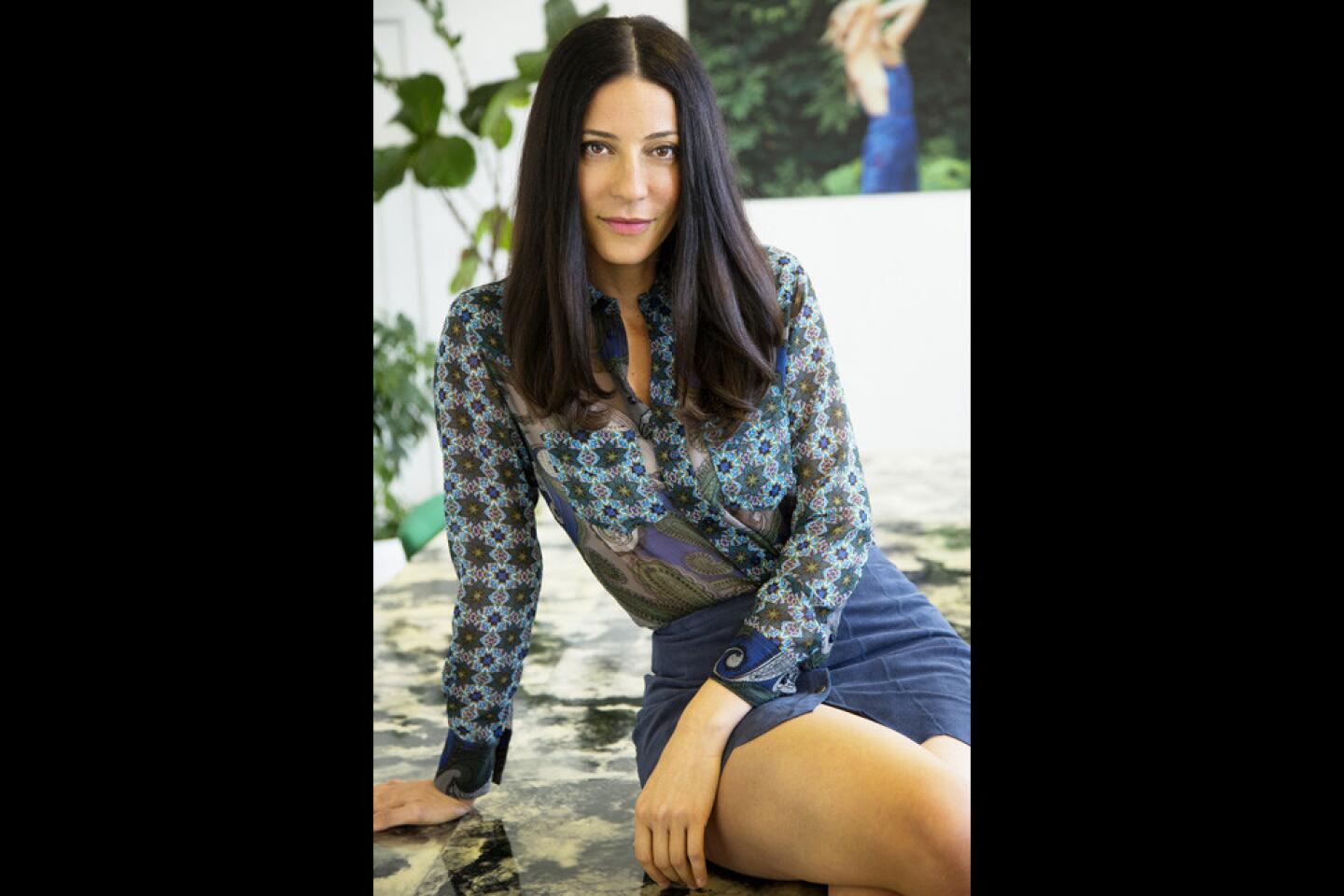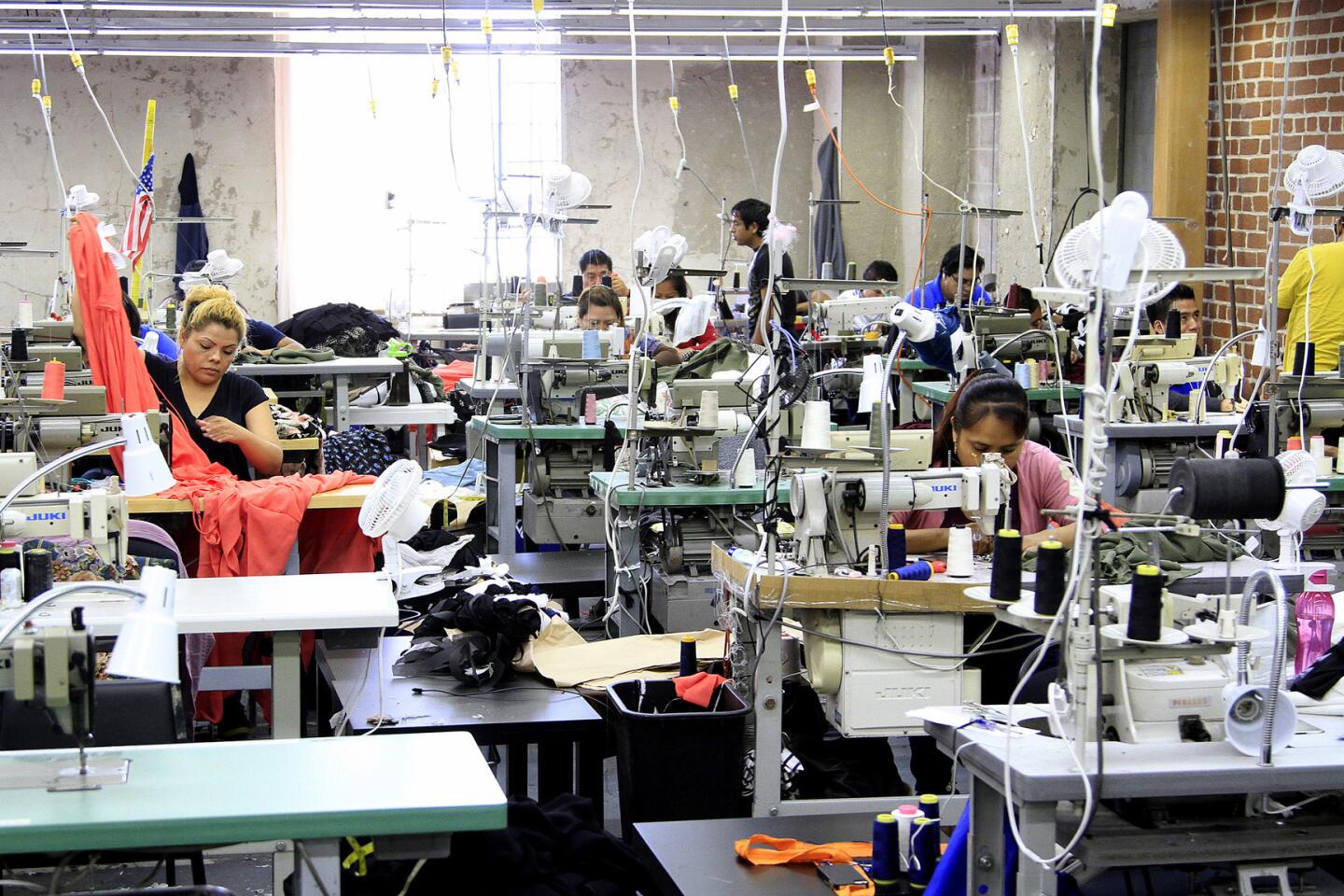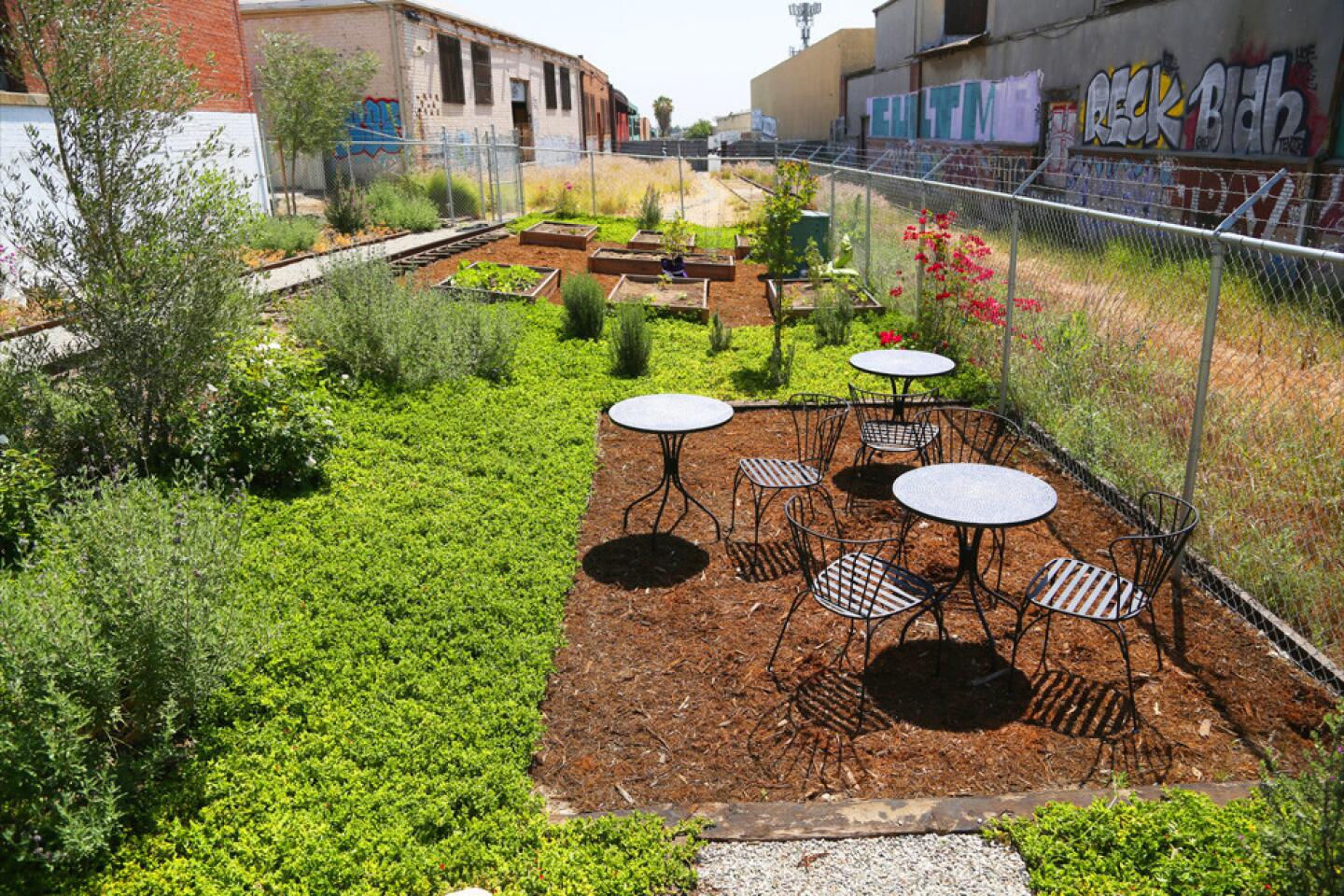Reformation’s Yael Aflalo brings cachet of cool to eco-friendly fashion
- Share via
A sunny orange sign opposite the reception desk at eco-friendly fashion brand Reformation’s headquarters and factory in downtown Los Angeles proclaims, “You are what you wear #jointhereformation.” Upstairs, a wall is painted with the message, “Fashion is the third most polluting industry in the world. Let’s clean up.” Guests are offered water in recycled Ball jars, while overflow water from the factory irrigates a garden filled with drought-resistant native plants.
Buying a dress or blouse from Reformation may feel a bit like buying into a social consciousness. And that just might be exactly what Yael Aflalo, the 38-year-old co-founder and chief executive, is banking on as she brings her cachet of cool to a less disposable, more environmentally responsible concept of fashion.
It doesn’t hurt that the brand’s devotees include Taylor Swift, Karlie Kloss, Rihanna, Sophia Bush, Ivanka Trump, Lauren Bush and Rosie Huntington-Whiteley.
In January, Swift purchased several of the label’s “Bill Murray” sweatshirts and then posted a photo on Instagram of herself and the Haim sisters, of the same-named L.A indie band, wearing them while on vacation in Hawaii.
On April 2, Kloss became a partial owner of the business, investing in the company during a $12-million round of Series A funding, as did Andrew Rosen, CEO of fashion brand Theory, and Russian fashion writer Miroslava Duma.
The company’s revenue in 2014 was $25million, and that number is expected to double or triple by the end of 2015, Aflalo says. Reformation is currently scouting locations in Venice and downtown L.A. for its fourth store.
Co-founded in 2008 by Aflalo and fashion designer Chi Bui (who left the company in 2012), Reformation was originally devoted to reworked vintage fashion pieces, crafted on-site in the brand’s first retail space on La Brea Avenue. Now that store has moved to Melrose Avenue, two more boutiques have opened in New York City and the line is created from about 65% eco fabrics, 20% repurposed vintage clothing and 15% dead stock fabrics.
Everything is designed, cut and sewn in Los Angeles, and approximately 70% of the pieces are created in-house at the company factory, which opened in late 2013. Aflalo gives concept direction to the design team and personally tries on every single item for fit. Manuel Ruyman Santos (formerly trend director at Zara) joined the company as design director in December 2014.
Aflalo describes the brand’s aesthetic as “sexy and feminine, but cool,” or even “minimalist” in terms of the lack of embellishment. Retro-inspired cuts have signature details such as plunging necklines, high slits and peek-a-boo cutouts. The vibe is femme fatale.
Affordability and scarcity are paramount.
While the average price point is $160, the range is from $28 for a Tencel-and-linen T-shirt to $598 for a wedding gown crafted of surplus silk that is part of a bridal collection that debuted in March 2014 — a natural extension for the brand, since dresses make up 50% of sales.
The limited quantities of vintage and dead stock fabrics make rarity an integral part of the business. Fifteen new styles in three colors each (45 total) launch weekly on thereformation.com, and the company only produces about 200 of each.
“Basically, what we try to do is to get out while it’s hot,” Aflalo says. “We want to always make less than what people want us to make so, in that way, it’s special. It keeps things exclusive.”
Sustainable fashion activist Suzy Amis Cameron is a fan and asked the company to design a collection of dresses in February based on Oscar gowns created for her annual Red Carpet Green Dress challenge.
“I really admire the way Reformation thinks outside the box in the fashion world,” Cameron says. “It was great to see a company reusing, recycling and up-cycling on so many different levels, from the way they make clothes to the way they operate in their facility. They don’t make seasonal clothes that go out of style quickly. They make pieces that can be worn over and over, depending on how they are accessorized … clothes that are versatile and sustainable.”
This isn’t Aflalo’s first foray into fashion.
In 1999, she designed a skirt that caught the eye of local designer John Eshaya, then womenswear buyer for Fred Segal, which led to the launch of the fashion brand Ya-Ya (Aflalo’s nickname while growing up).
“I think [Yael’s] strength is that she’s always had a really great connection to what cool girls are wearing,” Eshaya says. “She’s always been really smart as far as what girls want now. I think that’s what makes her a great designer.”
After shuttering Ya-Ya and before launching Reformation, Aflalo traveled to China for a project and was overcome by the level of pollution in a region known for fashion manufacturing.
“You could hardly see or breathe … I really started to have a feeling of accountability for my role in things and this sense of empathy for the world,” she says. “Like there’s this capitalist guy with a cigar in his mouth, dumping sewage into a creek. I could do better than that. I started researching and [discovered that] making sustainable choices is not that hard. It may be slightly more expensive at the onset, but in the end it pays for itself.”
In honor of Earth Day on Wednesday, Reformation plans to launch the Low Carb Collection, a dozen styles produced with minimal carbon dioxide emissions. Model and DJ Atlanta de Cadenet Taylor will pose in the pieces on thereformation.com. The line also marks the debut of a site-wide initiative to highlight carbon dioxide emissions and water usage for every item sold.
“It’s very much training people to think about how much things cost — not just to their wallet, but to the environment,” Aflalo says. “The mission is to lead and inspire a sustainable way to be fashionable.”













